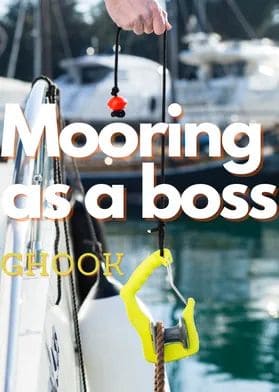Wind Indication & ClinometersProducts found: 12
Sale of Wind Indication & Clinometers
On this page, you will find a catalog with prices for nautical wind indication devices and clinometers. All products come with the manufacturer's quality guarantee.
Wind indicators and clinometers are important tools for sailors and boat owners. They help to optimize boat control by providing better understanding of wind conditions and the angle of inclination. Here are some features for their use and recommendations for choosing them:
Wind Indicators
These tools allow you to see the direction and force of the wind. This is especially useful for maneuvering and choosing the optimal course.
This equipment includes anemometers, including signal ones, as well as wind indicators. Wind can be used as auxiliary accessories showing the direction of the wind sleeves, or wind socks.
Mechanical wind indicators are the simplest and most inexpensive devices that help determine the direction of the wind, which is an important parameter in maritime affairs, especially for sailing yachts.
Anemometers
Gusts of wind pose a serious danger and can serve as harbingers of storms, so it is very important to detect changes in meteorological conditions in time. This can be done using a signal anemometer, the main purpose of which is to work on high-altitude equipment, for example, on tower cranes, ship masts, etc.
An alarm anemometer is not only a device for measuring wind speed, it is also capable of signaling danger. The alarm anemometer consists of a wind sensor located at a given height and a display unit configured with one or more wind speed values at which a warning or alarm is generated.
The signal anemometer sensor is usually made in the form of a cup propeller; the main unit requires electrical power to operate. All data, including warnings or alarms, response time, wind speed, are stored in the device’s memory and can be downloaded and analyzed on a computer or special equipment.
If there is a display, the signal anemometer can be a multifunctional device capable of not only measuring wind speed and sending various signals, but also measuring atmospheric pressure, relative humidity and other weather parameters.
Anemometers can be part of weather stations installed on ships, with the help of which not only the issue of measuring current meteorological values is resolved, but also weather forecasts for the near future are created, and with their help the safest route for the ship is laid out. The boatmaster's awareness of possible weather changes for the worse is one of the most important aspects of navigation safety. An anemometer is one of the most objective and reliable tools for making decisions about the movement of a vessel in one direction or another.
In addition to signal anemometers, which are not only a measuring device, but also a warning device, the marine equipment market offers compact multifunctional anemometers, including portable ones that can be carried, including additional capabilities.
In addition to wind speed, presented in marketplaces topRik anemometers are capable of measuring temperature and humidity, have positive buoyancy, backlighting, a durable waterproof housing, and can be mounted on a tripod to increase measurement accuracy.
Signal Anemometer Design
Unlike portable ones, signal anemometers are more complex devices, consisting of several parts - a wind sensor and an information block. The top of the display always shows the current wind speed, and you can select units that are more appropriate to the situation, for example, km/h or mph, knots, m/s, ft/s. The spinner sensor needs calibration; the device can perform self-diagnosis and go into a state with factory settings.
Anemometers are often produced in the form of sensors designed to be connected to the main equipment of the same manufacturer or compatible companies.
Clinometers
A clinometer is a special device used in sailing and water sports to measure and control the angle of heel of a vessel. They are equipped with indicators that allow you to determine the angle of inclination of the vessel relative to the horizontal plane.
This information is critical for sailboats to enable them to optimize weight distribution on the boat and achieve optimal speed and handling.
Clinometers are divided into the following types:
- bubble;
- pendulum;
- electronic.
One of the simplest clinometers is the usual bubble level or protractor, which displays the deviation from a given axis by the displacement of a water bubble relative to the zero point of the instrument scale. Another version of the mechanical pendulum clinometer is a device consisting of a frame, a plumb line and a compass; it performs the same function, with the only difference being that the role of the deflecting bubble is assigned to the plumb line.
However, there are conditions in which the use of static clinometers is impossible, even if their design is perfect, since the dynamics of the object's movement can have a significant impact on the quality of measurements. Under such conditions, the error of pendulum and bubble inclinometers reaches 30%. That is why in maritime affairs electronic inclinometers are used that are not sensitive to horizontal and vertical acceleration, but at the same time have extremely high measurement accuracy. As is known, under conditions of constant pitching with varying amplitudes, a ship at sea has all degrees of freedom and is subject to roll, trim and yaw.
The ship's electronic clinometer must reliably measure all these parameters, visualize them for transmission to the bridge, and also transmit them to the voyage data recording (VDR) system, similar to black boxes in aviation.
ATTENTION! Disasters of large ferries that occurred at the end of the 20th century led to a revision of international standards and maritime safety norms. In May 1999, the International Maritime Organization (IMO) adopted a corresponding resolution, according to which all ships built after 07/01/2002, as well as ships with a displacement of 3000 tons or more, are required to be equipped with voyage data recorders. Subsequently, the resolution was particularly expanded for shipboard electronic clinometers.
This means that ship's measuring instruments, including ship's electronic clinometers, must meet the technical requirements of VDR and constantly transmit correct data to the system. According to the resolution, “electronic clinometers must determine the ship's roll angle, amplitude and period of roll, display information on a display located on the navigation bridge, and provide instantaneous data on the ship's roll angle to the voyage data recorder.”
In order for the vessel in operation to comply with international standards and safety regulations, it is very important to have high-quality equipment on board. The reliability and accuracy of ship equipment in the event of an emergency will allow making a timely, correct decision, on which the life of the crew may depend.
By entrusting the supply and installation of equipment to a reliable supplier, you ensure the safe operation of the vessel and the confidence of the crew in the ability to overcome any trials at sea and emerge with dignity from any emergency situations.
topRik marketplace offers ship automation and control systems that meet all IMO requirements.
Clinometers can be analog or digital. They are mounted on the vessel in such a way that their indicators are clearly visible to the pilot or crew.
Modern clinometers can also be integrated with other electronic devices on board the vessel, allowing data to be automatically analyzed and the optimal heel angle maintained.
Clinometers are an essential tool for sail racing and other water-based competitions where precision boat control is critical. They help athletes make decisions based on accurate information about the condition of the boat and optimize their strategy to achieve the best results.
How to Choose
The choice of alarm anemometer depends on the desired accuracy, the need to obtain danger or alarm signals for different wind speeds, conditions of use, etc. When purchasing an anemometer, you should consider what marine equipment is already on board and whether a compatible anemometer cannot be used with an MFD or other devices already installed.
Also consider the following tips when choosing weather equipment for your boat:
- Type of mount: make sure the indicator or clinometer is suitable for your boat and can be easily installed.
- Readability and visibility: choose models with good visibility. This is particularly important in poor weather conditions.
- Materials: preference should be given to materials that are corrosion-resistant and UV-resistant.
- Accuracy: it's important for the instruments to be accurate. Errors in data can lead to incorrect decisions on the water.
- Electronics vs mechanics: electronic indicators and clinometers usually offer more features and high accuracy, but they also require a power source and may be less reliable in extreme conditions.
- Additional features: some models offer extra features such as backlighting, integration with other navigation systems, or even mobile apps for added convenience and functionality.
- Price: determine your budget and try to find a balance between price and quality.
- Warranty and service: learn about the warranty commitments and availability of service maintenance for the chosen model.
In the topRik marketplace you can easily and quickly select and buy not only a signal anemometer or a suitable clinometer, but also any marine equipment for a yacht or boat of any type. topRik experts will advise you free of charge on the specifics of using any type of marine equipment and its compatibility with various brands. Call us using the phone number above telephone call, use Contacts section, or send a message to [email protected].


